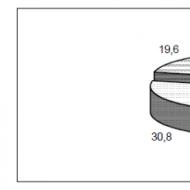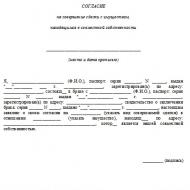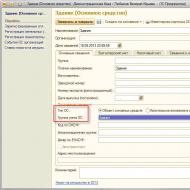
Construction contract for an individual house. Legal addresses and bank details of the parties. Essential terms of a construction contract
A contract for the construction of a cottage can perhaps be compared to an air ticket. The higher the cost of services (builders or aviators), the more nice bonuses provided for the client. However, before signing a contract with builders, the customer should make sure that he is not being offered the lowest quality service at a premium price.
A contract for the construction of a private house refers to domestic contracting agreements. This document will have legal force if it contains the following essential conditions: start and end dates of work; list of services performed by the contractor; their cost. The contract must also contain the date of its conclusion, as well as the full name and address of the construction company (individual entrepreneur or private person undertaking the work).
Previously, the Divandi portal talked about the peculiarities of imprisonment. Formally, a contract for the construction of a house and a contract for repairs are practically no different from each other. Both deal with the provision of construction services. However, in the case of a contract for the construction of a house (cottage), much more attention should be paid to information about the “labor results” of the builders.
Elena Khairullina
Head of Pravoved LLC
The subject of the contract is what must be built, and in the most detailed description. And even if the contract does not provide for a construction project as an annex to it, the description of the object must be so detailed that it is possible to understand what was planned to be built. If during construction the idea for the object undergoes changes, all of them, without exception, must be included in the contract in the form of additional agreements.
The ideal option is when the contract is based on a detailed house design and specification with a full list of works and necessary materials.
Alexey Rusakovich
When work is carried out on the project, a note is placed on each sheet of project documentation that the project is being transferred to work, and the customer and contractor sign under it. If the contractor has the status of a legal entity (for example, LLC), he puts his seal on each sheet of the project. With such a system, the team will not be able to voluntarily retreat from the project.
The project is an annex to the agreement, which is mentioned in the agreement itself. Another appendix should be an estimate for the work and purchase of materials. As a rule, the final version of the contract is signed after the estimate has been drawn up. Lawyer Alexander Latyev advises to include in the contract a clause according to which the person who purchased them is responsible for the quality of materials.

Customer, make yourself comfortable.
Often several contracts are concluded in succession for the construction of a cottage: the first for the foundation; the second - on the box with the roof; the third is for finishing. This is especially often practiced when building houses from logs, carriages or beams of natural moisture. After constructing the roof, such a house “sits” within 6-12 months. Therefore, builders often offer to conclude one contract for the box, and a year later a second one for the final finishing (windows, doors, stairs, finishing, etc.). At the same time, as Alexey Rusakovich notes, if you work according to this scheme, then there is a high probability that for each new stage an agreement will be concluded with a new contractor: first with a team of concrete workers, then with a team of installers, etc. And as a result, each new contractor will blame his sins on the deficiencies left by the previous team.
Alexander Latyev
Legally, it is better to conclude one contract at once for the entire range of work on building a house, regardless of what construction technology is used. A different choice may be determined by the requirements of accountants, etc., but sometimes by the contractor’s reluctance to be responsible for the entire work as a whole.
Lawyer Elena Khairullina also believes that an end-to-end agreement is more convenient for the customer. Moreover, this agreement should provide for the phased acceptance of work from the builders.
Elena Khairullina
Head of Pravoved LLC
It is desirable that the contract obliges the contractor to hand over hidden types of work to the customer at each stage of construction. It’s good when the acceptance of both hidden types of work according to the act and the object as a whole is carried out with the involvement of a specialist in the field of construction and all shortcomings are correctly documented in the work acceptance certificate indicating decisions taken about methods and timing for eliminating deficiencies. If there is a delay or poor quality of work, the mentioned clauses of the contract will help the citizen to recover a penalty from the builders.
Alexey Rusakovich reminds us of one more point that it is advisable to reflect in the contract.
Alexey Rusakovich
No construction site is guaranteed against freezing. Most often, this happens because the customer has run out of money. But there are other reasons. The contract should include a clause on the conservation of the object. It is carried out at the expense of the customer, but it can be stipulated that the contractor’s workers and equipment are involved in conservation. However, specific works It makes no sense to stipulate conservation in the contract. After all, it is unknown at what stage the work will have to be interrupted - on the foundation pit, on the foundation, on the walls...

Terms of execution of the contract.
If construction work is performed individual entrepreneur(IP) or construction firm in LLC status, then such contractors are subject to the Consumer Protection Law. This document provides for a penalty for failure to meet deadlines in the amount of 3% of the contract amount for each day of delay. This rule on fines for leisurely builders works even if there is no penalty clause in the contract. However, as lawyer Alexander Latyev notes, this provision of the law does not work if a private owner has contracted to build the house.
Alexander Latyev
Head of Practice, Legal Security Agency "Intellect-S"
If we are talking about a contract with a contractor who is not an entrepreneur, then it should be borne in mind that according to general rule it is not subject to the Consumer Protection Law, and the liability conditions for it are less strict than for merchants. For this reason, the customer, when concluding a contract with a private owner, must insist that the contract contains clauses regarding his additional protection. In particular, this may be a clause on penalties for failure to meet deadlines.
Alexander Latyev recommends indicating in the household contract a penalty in the form of a penalty in the amount of 0.1% per day of delay, maximum - 0.3-0.5% per day. If you put more, the court will most likely reduce the amount of sanctions at its discretion.

Do not let the builders take over the contract.
The customer should remember that the builders he hires are much better versed in the issues of drawing up construction contracts than he is. Builders work with these papers all the time, therefore, it is not difficult for them to include in the contract harmless – at first glance – clauses, which in fact are quite disadvantageous to the client. In one of the contracts for the construction of a cottage, for example, there is the following phrase: “The place for garbage removal is determined and agreed upon by the customer.” Using this clause of the contract as an excuse, the team tried to refuse to remove waste from the site, on the grounds that the customer did not fulfill the condition he signed and did not provide the builders with access to the landfill. However, as the lawyer notes, such a position of the contractor looks quite precarious.
Andrey Saunin
Garbage removal is the responsibility of the contractor, the cost of which is usually included in the cost of the work, unless otherwise specified in the contract. The requirement for the customer to agree on addresses for waste removal seems absurd, since there are official landfills in any territory.
However, lawyers unanimously advise private customers not only to read the contract proposed by the builders, but to strictly remove from it all incorrect, illiterate and vague wording. If a certain point is truly necessary, then it must be redone to remove the possibility of double interpretation.
Alexander Latyev
Head of Practice, Legal Security Agency "Intellect-S"
Most often, in contracts offered by builders to private customers, there are clauses on limitation of liability, establishment of short deadlines for filing a claim, indisputability of drawn up acts of work, automatic acceptance of work in the event of no response to submitted acts within a certain period of time, etc... But I note that any, even the most unfavorable point, has its price. The more unfavorable clause the contractor inserts into the contract, the lower the price should probably be or there should be some other conditions favorable to the customer.
The head of the Ural SRS company, Alexey Galimov, says that even if the customer signed an agreement with unfavorable conditions for him, then perhaps there is no need to despair. Most likely, some of these bad clauses are contrary to the law, and if the case goes to court, then such terms of the contract will be declared invalid. For example, a contractor may insert a clause into the contract that states that the builders are not responsible for defects if the customer does not point it out to them in time. Such a clause will not have legal force.

Conclude a construction contract without a project.
Alexey Galimov
You can build a house without a project. But only if it is a fairly standard building without individual features. And even then it will not be possible to completely avoid defects in work. And most importantly, it will be difficult to agree with the customer about whether a mistake was made in this particular case or whether everything was done in accordance with his requirements.
However, as representatives of the brigades admit, today large percentage private houses are being built without a design. Often it is replaced by simply a set of pictures of facades and a hand-drawn floor plan. Lawyers believe that even in such extreme conditions it is possible to draw up a contract that will help build sufficiently high-quality housing and resolve most misunderstandings between the contractor and the customer. The head of Pravoved LLC, lawyer Elena Khairullina, in particular, recommends including in the contract information about the size of the object, the number of floors, data on the type of foundation, a description of the method of constructing structural elements of construction, the types of used building materials. The description may be included in a separate annex to the contract.
Andrey Saunin
head of a law office
If construction is carried out without a project, then the contract, at a minimum, must contain such a description of the object from which it will be possible to draw a conclusion whether the finished object complies with the agreements of the parties. However, it is advisable to have a well-developed preliminary design of the house, a technical and functional description as an annex to the contract.
The technical description of the cottage could be something like this:
- A two-story house with a cold attic and a gable roof. The foundation is monolithic, strip, concrete M300, strip width 400 mm, buried 500 mm, above ground - 500 mm.
- External dimensions – 6 by 9 meters.
- Living area – 55-60 sq.m. m.
- Number of floors – 2.
- The clear height of the floors is 2.7 m.
- The material of the external walls is 400 mm twin blocks.
- External wall insulation – 100 mm basalt slabs.
- Partitions – twin blocks 200 mm.
- Type of floors – on wooden beams 200 mm.
- Insulation of floors - 200 mm basalt slabs.
- Roof type – bitumen shingles.
- External wall finishing is decorative bark beetle plaster.
- The external finishing of the base is natural stone.
- The windows and window sills are plastic, the slopes are plaster.
Functional Description:
First floor: covered porch, vestibule, bathroom, hallway-staircase hall, kitchen-dining room. On the second floor of the house there are two bedrooms, a staircase hall, and a bathroom. Heating is from a gas boiler installed in the kitchen.

How much does the right contract cost?
Dozens of law firms and privately practicing lawyers are ready to provide assistance in the analysis of domestic contract agreements in Yekaterinburg. If the contract deals with a full cycle of work on the construction of a private house, then the cost of the service for its preparation ranges from 3-10 thousand rubles. You can come to a lawyer with a ready-made contract (for example, proposed by a construction team). Analysis and correction of such a document will cost about 2 thousand rubles.
In turn, if the customer suffered losses due to a lawyer who made a mistake when drawing up the contract, then he (the customer) can demand compensation from the lawyer. However, as legal scholars themselves note, not yet judicial practice on similar matters.
You can download a version of the household contract for the construction of a house.
You can download a version of a household contract for the construction of a foundation.
for the construction of an individual residential building in a person acting on the basis, hereinafter referred to as " Contractor", on the one hand, and gr. , passport: series, No., issued, residing at: , hereinafter referred to as “ Customer", on the other hand, hereinafter referred to as the "Parties", have entered into this agreement, hereinafter " Agreement”, about the following:1. THE SUBJECT OF THE AGREEMENT
1.1. The Contractor undertakes, in accordance with the project of an individual residential building (hereinafter referred to as the Project) and the Technical Specifications (Appendix No. 2), to carry out the construction of an individual residential building (hereinafter referred to as the Work) located at the address: (hereinafter referred to as the Object), and the Customer undertakes to accept and pay for the Work in accordance from clause 2.1 of this Agreement.
1.2. The materials necessary to perform the Work are supplied by the Contractor at the cost specified in this Agreement.
2. COST OF WORK AND PAYMENT PROCEDURE
2.1. The cost of the Work, broken down by stages of the Work, is indicated in Appendix No. 1 to this Agreement and amounts to Russian rubles. From the moment of signing this Agreement stated cost is considered fixed and can be increased only if changes are made to the Project.
2.2. Payment for the Work is carried out by the Customer in stages, in the following order:
2.2.1. The advance payment for each Stage, in the amount of 80% of the cost of this Stage, is paid by the Customer within calendar days from the date of receipt from the Contractor of notification of readiness to begin work on this Stage.
2.2.2. The Customer pays the additional payment for each Stage, in the amount of % of the cost of this Stage, within calendar days from the date of completion of work on the Stage.
2.3. All calculations are made in Russian rubles.
2.4. In case of violation of the payment schedule by the Customer, the Contractor has the right to suspend work for a period equal to the time of delay in payment.
3. ORDER OF WORK
3.1. The contractor begins work within calendar days from the date of payment of the advance payment for the first stage.
3.2. The deadline for completing work at each stage is indicated in Appendix No. 1. In case of early completion of the Work by the Contractor, the Customer is obliged to accept and pay for the completed Work in accordance with clause 2.2.
3.3. Upon completion of the work under the Contract, the Contractor shall provide the Customer with an acceptance certificate for the completed Work.
3.4. Within working days, the Customer is obliged to sign the acceptance certificate for the completed work or send a reasoned written refusal indicating specific comments on the completed Work. If within the specified period the Customer does not sign the acceptance certificate for the completed work or does not send a reasoned refusal, the Work is considered accepted and is subject to payment.
3.5. In the event of a reasoned refusal by the Customer, the Parties draw up a bilateral act with a list of necessary improvements and deadlines for their implementation. Modifications, the need for which arose due to the fault of the Customer, are carried out at the expense of the Customer, in excess of the cost specified in clause 2.1 of this Agreement. Improvements, the need for which arose due to the fault of the Contractor, are carried out at the Contractor's expense.
3.6. In the event of early termination of this Agreement, the Parties are obliged, within calendar days from the date of termination of work, to draw up a bilateral act on the completed part of the work and the actual expenses incurred by the Contractor.
4. RESPONSIBILITY OF THE PARTIES
4.1. Until the signing of the acceptance certificate for the work performed under the Contract, responsibility for the safety material assets at the construction site is borne by the Contractor.
4.2. The parties are responsible for failure to fulfill their obligations under this Agreement in accordance with the legislation of the Russian Federation.
4.3. In case of untimely fulfillment of its obligations under the Agreement, the guilty party shall pay the other party a penalty in the amount of % of the value of the unfulfilled obligations for each day of delay, but not more than % of the value of the unfulfilled obligations.
4.4. Payment of penalties and fines does not relieve the obligations of the parties to fulfill this Agreement.
5. OBLIGATIONS OF THE PARTIES
5.1. The customer is obliged:
5.1.1. provide the Contractor with a plot of land to carry out the Work;
5.1.2. provide temporary connection points for communications;
5.1.3. provide the contractor with constant and unhindered access to the site, including ensuring unhindered access to the site for construction equipment and freight transport;
5.1.4. if it is impossible for freight transport to approach the construction site directly, all additional expenses related to the reloading and delivery of materials to construction site paid by the Customer in excess of the cost of the Work specified in clause 2.1 of this Agreement;
5.1.5. accept the work performed from the Contractor according to the certificate;
5.1.6. make payment in accordance with the terms of this Agreement.
5.2. The contractor is obliged:
5.2.1. carry out work in accordance with the project and Terms of Reference;
5.2.2. if it is impossible to carry out further work, immediately inform the Customer;
5.2.3. after completion of the Work, remove from the construction site construction garbage and construction equipment;
6. WARRANTY
6.1. The Contractor guarantees high-quality performance of work and timely elimination of significant shortcomings and defects that arose through the fault of the Contractor and were identified during acceptance of the work or during the warranty period.
6.2. The Contractor bears responsibility within the warranty periods and obligations established by this paragraph. The warranty period for civil works is years from the date of completion of the work. The warranty period for finishing work and utilities is years from the date of completion of the work. Warranties for windows, doors, furniture, and engineering equipment are established in accordance with the manufacturer’s warranty obligations.
7. EARLY TERMINATION
7.1. The Agreement may be terminated by the Parties by mutual agreement of the Parties, or by a court decision or in accordance with Section 8 of this Agreement.
7.2. The customer has the right to unilaterally terminate this agreement early in the following cases:
7.2.1. if the start of work is delayed due to the Contractor’s fault by more than calendar days;
7.2.2. if the Contractor made significant deviations from the contract in the work and did not correct these deviations within a reasonable time.
7.2.3. The Contractor has the right to unilaterally terminate this agreement ahead of schedule if the Customer does not pay the advance or does not pay in full, within calendar days from the date of receipt from the Contractor of notification of readiness to begin work under this Agreement.
7.3. In the event of early termination of the Agreement, the Parties are obliged to make mutual settlements within calendar days from the date of signing the act on the completed part of the work, taking into account the work performed by the Contractor and payments made previously.
8. GROUNDS FOR EXEMPTION FROM LIABILITY
8.1. Neither party will be liable for failure to perform or proper execution one of the parties to its obligations if proper fulfillment turned out to be impossible due to force majeure, that is, extraordinary and unavoidable circumstances under the given conditions that arose after the conclusion of the contract. Such circumstances include the parties: forest fire, flood, earthquake, other natural disasters, war, hostilities, adoption by public authorities and management of regulations that make it impossible for the parties to fulfill or properly fulfill their obligations.
8.2. If any of these circumstances directly affected the failure to fulfill the obligation within the period specified in the contract, then this period is extended in proportion to the duration of the relevant circumstance.
8.3. A party for which it has become impossible to fulfill its obligations under this Agreement as a result of the circumstances specified in clause 8.1 is obliged to immediately notify the other party.
8.4. If these circumstances last more than months, each party has the right to unilaterally terminate this agreement by notifying the other party calendar days before the date of termination.
9. DISPUTE RESOLUTION PROCEDURE
9.1. Disagreements arising between the Parties in connection with this Agreement will be resolved by the Parties through negotiations.
9.2. If agreement cannot be reached, then all disputes and disagreements under this agreement shall be submitted to the court for consideration.
9.3. In all other respects that are not specified in this agreement, the parties are guided by the legislation of the Russian Federation.
10. OTHER CONDITIONS
10.1. This agreement comes into force from the moment of its signing and is valid until the Parties fully fulfill their obligations under the agreement.
10.2. All changes and additions to this agreement are valid if made in writing and signed by the Parties.
Please note that the contract agreement was drawn up and checked by lawyers and is exemplary; it can be modified taking into account the specific conditions of the transaction.
The Site Administration is not responsible for the validity of this agreement, as well as for its compliance with the requirements of the legislation of the Russian Federation. AGREEMENT No. ____ ABOUT THE CONSTRUCTION OF A RESIDENTIAL HOUSE in the city of _____________ "__"____________ 199__ ____________________________________________________ we refer__ in, (name of the enterprise) hereinafter as the "Contractor", represented by _______________________________________, (position, full name) acting on the basis of ________________________, on the one hand , and (Charter, regulations) _____________________________________________, hereinafter referred to as (name of the enterprise) “Customer”, represented by ___________________________________________________, (position, full name) acting on the basis of _________________________, on the other hand, (Charter, regulations) have concluded this agreement on the following: 1. Subject of the agreement 1.1. The Contractor undertakes in accordance with the terms of reference, design and estimate documentation and schedule construction work carry out the construction of _____________________________________________________ (indicate individualizing features) of a residential building within the period from ___________ to __________, and the customer undertakes to accept the work and pay for it. 1.2. advance payment in the amount of _____% of the total estimate; - within _____ banking days from the date the parties signed the work acceptance certificate, the final payment in the amount of _____% of the total estimate. customer. 4.5. For violation of payment terms for work, the customer pays the contractor a penalty in the amount of _____% of the cost of work for each day of delay. 2.3. All payments are made in rubles at the rate of the Central Bank of the Russian Federation in effect on the day of transfer of funds. 2.4. Value added tax on the work performed must be indicated for each item of the estimate separately and as a whole according to the total and when paying is allocated a separate amount in payment order, schedule, technical documentation, construction materials, equipment, ensure continuity of construction financing, accept the completed residential building from the contractor according to the acceptance certificate. 6.2. The customer is obliged to pay for the work., transferred to the contractor in a portion exceeding the cost of the work actually completed and accepted by the customer. 8. Grounds for exemption from liability 8.1. Neither party will be liable for failure to fulfill or improper fulfillment of its obligations by one of the parties if proper fulfillment turned out to be impossible due to force majeure, that is, extraordinary and unavoidable circumstances under the given conditions that arose after the conclusion of the contract. Such circumstances include the parties: fire, flood, earthquake, other natural disasters, war, hostilities, strikes, adoption by public authorities and management of regulations that make it impossible for the parties to fulfill or properly fulfill their obligations. G. ___________________. 10. Applications 10.1. Attached to this agreement as its integral part: 1. Terms of reference for the construction of a residential building; 2. Schedule of work for the construction of a residential building; 3. Estimate of work for the construction of a residential building;
4. Requirements for the operation of a residential building.
11. Conclusion 11.1. This agreement comes into force from the moment it is signed by the parties and is valid until the parties complete their obligations under the agreement.
11.2. All changes and additions to this agreement are valid if made in writing and signed by the parties. 11.3. Addresses and Contractor", on the one hand, and gr. , passport: series, No., issued, residing at: , hereinafter referred to as “ Customer", on the other hand, hereinafter referred to as the "Parties", have entered into this agreement, hereinafter " Agreement Bank detailsparties: Customer: ________________________________________________________________ _______________________________________________________________________ _______________________________________________________________________ Contractor: ________________________________________________________________ _______________________________________________________________________ _______________________________________________________________________ Signatures of the parties: Client Contractor _____________________ _____________________ M.P. M.P.
Free samples of claims, complaints, contracts, etc. site WORK AGREEMENT for the construction of a residential building (cottage) in a person acting on the basis, hereinafter referred to as "”, about the following:
1. GENERAL PROVISIONS 1.1. Contractor - entity in accordance with the legislation of the Russian Federation, attracting funds from the Construction Customer in accordance with this Agreement and current legislation for construction (creation) on this plot of land
residential building (hereinafter referred to as the Cottage) on the basis of a received construction permit.
- 1.2. Contractor's right to engage
- Money
- , citizens for the construction of a cottage with the assumption of obligations, after fulfillment of which the citizen may have ownership rights to a detached cottage house in a cottage under construction, are confirmed
- constituent documents
- enterprises.
- Preliminary description of the Construction Project according to the design documentation:
- Street ;
House, building, possession; Future room number; Total project area;
Actual area;
1.4. Relations between the Contractor and the Construction Customer that are not regulated by this Agreement are regulated by the current legislation of the Russian Federation.
2. SUBJECT OF THE AGREEMENT
2.1. Under this Agreement, the Contractor undertakes to build a cottage (house) within the period stipulated by the Agreement on his own and (or) with the involvement of other persons and transfer the Construction Project to the Customer. The construction customer undertakes to pay the agreed price of the Contract and accept the Object. Achieving the goal stated above is carried out by providing financing (investment) and organizing design. All actions under this Agreement, including financing, construction (construction) and commissioning of the cottage.
2.2. The deadline for the Contractor to transfer the Construction Project to the Construction Customer is no later than 2016.
2.3. The warranty period for the construction project is 3 years.
2.4. In the event of the death of a citizen - the Customer of the construction, his rights and obligations under the Agreement pass to the heir or heirs. The property rights and obligations existing on the day of opening of the construction Customer’s inheritance based on the Agreement are included in the construction Customer’s inheritance.
3. PRICE OF THE CONTRACT
3.1. The Contract Price is the amount of money payable by the Construction Customer to the Contractor under this Contract. The funds paid by the Construction Customer under the Contract are used to achieve the final result of the Contract - the construction of the Construction Project, effective use funds and coverage of other direct and indirect costs related to management, control, study of the housing market during the construction of the Construction Project, etc.
3.2. Price of the Agreement at the time of conclusion of the Agreement in rubles.
3.3. By mutual agreement of the Parties, the price of the Agreement may be changed in the following cases:
- making changes and additions to project documentation in accordance with changes in current legislation;
- adjustments to the area of the Construction Project by more than 1 sq. m;
- adjustments to the total volume of the Construction Project by more than 1 cubic meter. m;
- making changes to the composition of the Construction Project by agreement of the Parties.
3.4. Payment of the Contract price is made in stages by making a first installment (for work and materials necessary for construction) in the amount of % of the price of each stage of work and a second installment in the amount of % upon completion of each of these stages of work within days, except in cases where he has the right to demand elimination of deficiencies within a reasonable time.
3.5. Payment of the price of materials (used for construction) is made in the amount of 100% for each type of work, according to Appendix No. 2.
3.5. The construction customer undertakes to pay at his own expense the costs of Maintenance Construction site and utilities.
4. OBLIGATIONS OF THE PARTIES
4.1. The Contractor undertakes:
4.1.1. Fulfill your obligations under the Agreement in good faith.
4.1.2. Transfer the Construction Project to the Construction Customer no later than the deadline provided for in the Agreement;
4.1.3. If the construction of the cottage cannot be completed within the period stipulated by the Agreement, the Developer, no later than days before the expiration of the specified period, is obliged to send the construction Customer the relevant information and a proposal to change the deadline for the transfer of the Construction Project. A change in the term of transfer by the Developer of the Construction Project to the Construction Customer provided for in the Agreement is formalized by an additional agreement.
4.1.5. Transfer to the Construction Customer the Construction Project, the quality of which complies with the terms of the Contract and design documentation.
4.1.6. If any deficiencies are discovered in the Construction Project, immediately notify the Contractor.
4.2. The Contractor's obligations are considered fulfilled from the moment the Parties sign the transfer deed or other document on the transfer of the Construction Project.
4.3. The obligations of the Construction Customer are considered fulfilled from the moment the funds are paid in full in accordance with the Agreement and the Parties sign the transfer deed or other document on the transfer of the Construction Project.
5. RIGHTS OF THE PARTIES
5.1. The Contractor has the right:
5.1.1. Make changes and additions to the project of the Construction Project in agreement with the Customer and in cases provided for by existing or newly introduced building codes and rules, having previously notified the Customer of the need for such changes.
5.2. The construction customer has the right:
5.2.1. Contact the technical inventory bureau to determine the actual total area and (or) total volume of the Construction Project.
5.2.2. Contact the authorities that carry out state registration of rights to real estate and transactions with him, with a statement of state registration ownership rights to the Construction Project after the Contractor and himself have signed a transfer deed or another document on the transfer of the Construction Project.
6. RESPONSIBILITY OF THE PARTIES
6.1. For failure to fulfill and/or improper fulfillment of obligations under this Agreement, the Parties bear property liability in accordance with this Agreement and its Appendices.
6.2. In case of delay by more than calendar days, refusal or evasion of the Construction Customer (regardless of the reasons) from timely and full payment of funds in accordance with the deadlines established by the Payment Schedule, Appendices to this Agreement or the terms of the Agreement, the Contractor has the right to refuse to fulfill the obligations assumed under obligations under this Agreement unilaterally without compliance judicial procedures and payment of any interest or penalties.
6.3. If the Customers for the construction of this Agreement are several individuals, the withdrawal of one of them from the Agreement is not an obstacle to the further execution of the Agreement by the remaining person, if the remaining persons accept all the terms of this Agreement, or invite a new person to participate, notifying them in the prescribed manner. this Contractor.
6.4. The Parties recognize as sufficient grounds for termination of the Agreement the use by the other Party of information about the execution of the Agreement to the detriment of the other Party, including the disclosure by the Construction Customer of information about the Contractor’s activities that could harm the Contractor’s business reputation.
7. QUALITY GUARANTEES
7.1. The construction project is transferred to the construction customer without interior decoration and internal utility networks. The Parties agreed on the requirements for the Construction Project in Appendix No. 3 to this Agreement.
7.2. The construction customer has the right to present claims to the Contractor in connection with the inadequate quality of the Construction Project, provided that such quality is identified during the warranty period.
8. TRANSFER OF THE CONSTRUCTION PROJECT
8.1. The transfer of the Construction Project by the Contractor and its acceptance by the Construction Customer are carried out according to a transfer act signed by the Parties.
8.2. The construction customer, who has received the Contractor’s message about the completion of construction and the readiness of the Construction Project for transfer, is obliged to begin accepting it within working days from the date of receipt of the specified message.
9. UNILATERAL REFUSAL TO PERFORM THE AGREEMENT
9.1. The construction customer has the right to unilaterally refuse to fulfill the Agreement in the following cases:
- failure by the Contractor to fulfill the obligation to transfer the Construction Project within the period stipulated by the Contract;
- termination or suspension of construction of the Construction Project in the presence of circumstances clearly indicating that the Construction Project will not be transferred to the Construction Customer within the period stipulated by the Agreement;
- deviations by the Contractor from the terms of the Contract, which led to a deterioration in the quality of the Object, or other shortcomings that make it unsuitable for the use provided for in the Contract;
9.2. The Contractor has the right to unilaterally refuse to perform the Contract in the following cases:
- failure by the construction customer to fulfill the obligation to deposit funds;
- in other provided for by the Treaty cases.
10. RELEASE OF LIABILITY (FORCE MAJEURE)
10.1. A party that fails to fulfill or improperly fulfills its obligations under a contract when fulfilling its terms is liable unless it proves that proper fulfillment of obligations was impossible due to force majeure (force majeure), i.e. emergency and unavoidable circumstances under specific conditions of a specific period of time.
10.2. The Parties to this Agreement included the following as force majeure circumstances: natural phenomena (earthquake, flood, lightning strike, landslide, etc.), temperature, wind force and precipitation level at the place of fulfillment of obligations under the Agreement, interfering with normal operating conditions; fires, man-made disasters that occurred through no fault of the Parties; regulatory and non-regulatory acts of government and management bodies, as well as their actions or inactions that prevent the Parties from fulfilling the terms of this Agreement; strikes organized in established by law ok fighting, terrorist acts and other circumstances that are beyond the reasonable control of the Parties.
10.3. In this case, the deadline for fulfilling obligations is postponed in proportion to the time during which the circumstances or the consequences caused by these circumstances were in effect.
10.4. If force majeure circumstances last more than months, the Parties have the right to terminate the Agreement before its expiration.
10.5. The Party on whose territory the force majeure circumstances occurred is obliged, within days from the date of termination of the disaster circumstances, to notify the other Party about the nature of the force majeure, the degree of destruction and their impact on the execution of the Agreement in writing.
10.6. If the other Party makes a claim in this regard, the Party subject to force majeure shall be released from liability under a certificate issued by the chamber of commerce of its country.
11. FINAL PROVISIONS
11.1. In all other respects that are not provided for in this Agreement, the Parties are guided by the current legislation of the Russian Federation.
11.2. The parties will resolve disputes and disagreements arising between them through negotiations. In this case, negotiations mean both oral consultations conducted by the Parties and the exchange of written messages.
11.3. If agreement on the dispute is not reached during negotiations, the Parties shall resolve the dispute in court at the location of the cottage under construction.
11.4. The construction customer confirms that he is familiar with the title and other documents, which exercises the construction customer’s right to information in full.
11.5. All changes and additions are formalized by additional agreements of the Parties in writing, which are an integral part of this Agreement.
11.6. All notices and notices are valid if they are made in writing and delivered to the recipient by fax, email with confirmation of receipt, courier or registered mail.
11.7. This Agreement is drawn up in 2 copies, one for each of the Parties. All copies have the same content and legal force.
12. LEGAL ADDRESSES AND BANK DETAILS OF THE PARTIES
Contractor Legal address: Postal address: INN: KPP: Bank: Cash/account: Correspondent/account: BIC:
Customer Registration: Postal address: Passport series: Number: Issued by: By: Telephone:
13. SIGNATURES OF THE PARTIES
Contractor _________________
Customer_________________
Agreement construction contract: sample, essential conditions, grounds for the conclusion - all this raises many questions among its participants. Everyone wants to protect themselves from undesirable consequences associated with the dishonesty of the counterparty. A sample construction contract, as well as the nuances of its preparation and conclusion are given in this article.
Construction contract in the Civil Code of the Russian Federation
In accordance with Article 730 Civil Code RF construction contract is an agreement between the contractor (that is, the performer) and the customer, with whom the former assumes responsibilities for performing certain construction work, and the latter for accepting and paying for them in full.
In the case of individuals, we are usually talking about the renovation of apartments or private houses. From the point of view of the law, such cooperation is called a construction contract concluded to satisfy the everyday or other needs of a citizen.
Why enter into a construction contract for apartment renovation?
To carry out renovations in an apartment, you can simply hire a team of builders or finishers, having discussed all the conditions verbally. But in case of fraud or poor quality work, it is useless to make claims - it is almost impossible to prove the existence of an agreement without a contract.
Therefore, concluding a construction contract is a way to insure yourself against possible negative consequences, Firstly. This applies equally to both the customer and the contractor.
In addition, it is the contract that stipulates all the terms of cooperation, possible disagreements and ways to resolve them. In this way, the parties save themselves from the need to sit down at the negotiating table every time emergency situations arise. For example, the contract can include a clause on the contractor’s responsibility for damage to building materials or on his responsibilities if a defect is discovered in the work.
Essential terms of a construction contract
By virtue of Article 432 of the Civil Code of the Russian Federation, an agreement is considered concluded if the parties have reached agreement on the subject of the transaction and all the conditions for its execution.
The construction contract must reflect the following points:
- Subject of the agreement.
The specific type of work for which the contract is concluded is indicated. This could be cosmetic repairs, redevelopment of an apartment, construction of a cottage or country house with installation of all necessary communications, etc.
Important: the scope of work is established in accordance with the technical documentation and estimate - the provision of these documents is the responsibility of the customer. If there is a need for additional actions, the customer must make appropriate changes to the estimate, otherwise the contractor has the right to suspend the execution of the contract.
- Deadlines.
The contract specifies the start and end times of the work. By agreement, the parties may include in the contract deadlines for completing intermediate stages of work.
If the contract is concluded on the basis of full or partial prepayment, the contractor who has not completed the work in fixed time, will be obliged to pay the customer interest for the use of other people's funds.
In case of early termination of the contract due to the customer’s refusal of obligations, the latter must fully compensate for the losses incurred by the contractor, as well as pay for the work already performed by him.
Important: Article 717 of the Civil Code of the Russian Federation limits maximum size the amount of compensation for losses incurred by the contractor when the customer refuses to fulfill the contract: it should not exceed the difference between the price determined for the entire scope of work and the part paid for the actual work performed.
- Payment.
The procedure for settlements between the parties is determined. This can be partial or full prepayment or payment upon completion of the work. The contract price, that is, the cost of the work performed, is indicated in a fixed amount, or the basis for its calculation based on the results of cooperation is given (open price).
The best option is to define in the contract two components of the contract price: the base cost of the work reflected in the estimate, and the variable part - the current cost index. That is, the final calculation in this case is made taking into account the cost indicators at the time of delivery of the object. The cost index is determined by regional pricing authorities.
It is recommended to draw up a schedule for the completion and payment of work. Thus, the customer has the opportunity to control the process of execution of the contract by the contractor, and the latter can be confident in the timeliness of payments.
- Delivery procedure for building materials.
The parties are free to independently distribute responsibilities for providing the necessary materials - the legislation does not contain any restrictions in this regard. In practice, most often materials are purchased by the contractor in agreement with the customer. It is important to stipulate in the contract the requirements for quality and appearance materials.
- Procedure for acceptance of completed work.
Acceptance of completed work, in accordance with the provisions of clause 4 of Article 753 of the Civil Code of the Russian Federation, is formalized by the appropriate act. The object is considered handed over only after the signatures of both parties are affixed to the deed.
Violation by the customer of the deadlines for acceptance of work established by the contract entails the transfer of the risks of accidental destruction of the object from the contractor to the customer. In this case, the circumstances that led to the death do not matter (with the exception of cases of deliberate actions of the contractor to destroy the object).
Important: acceptance of completed work, as a rule, is carried out at the expense of the customer, therefore it is recommended to include in the contract a clause providing for the procedure for preliminary testing of engineering structures. This is especially true for work related to the installation of electrical communications.
Construction contract: completed sample
Moscow 02/14/2015
Construction contract
To carry out renovation work on an apartment located at the address: Moscow, st. Lenina, 1, apt. 1.
Limited Liability Company "Skillful Hands" represented by General Director Vasily Petrovich Ivanov, acting on the basis of the charter (hereinafter referred to as the "Contractor"), on the one hand, and Ivan Vasilyevich Petrov (hereinafter referred to as the "Customer"), on the other hand, entered into an agreement on the following :
1. The Subject of the Agreement
1.1 The Contractor assumes obligations to carry out repairs and finishing works in an apartment located at the address: Moscow, st. Lenina, 1, apt. 1.
1.2 The Contractor performs the following types works:
- relocation of interior doorways;
- combining a toilet and a bathroom;
- dismantling of non-load-bearing structures.
1.3 Work is carried out on the basis of:
- actual agreement;
- Appendix No. 1 - work schedule approved by the Customer;
- Appendix No. 2 - list of work performed;
- Appendix No. 3 - design project;
- Appendix No. 4 - summary estimate.
2. Duration of the contract
2.1 This Agreement is valid from the moment of its signing until full implementation by the parties accepted obligations, as well as expiration of the warranty period.
2.2 The deadlines for completing the work are determined in accordance with Appendix No. 1.
2.3 The beginning of the work is considered to be the first working day from receipt of the advance payment.
3. Rights and obligations of the parties
3.1 The Contractor is obliged to perform a set of works in accordance with the Customer’s requirements.
3.2 The customer is obliged to accept the work performed and pay in full accordance with the contract.
Don't know your rights?
















